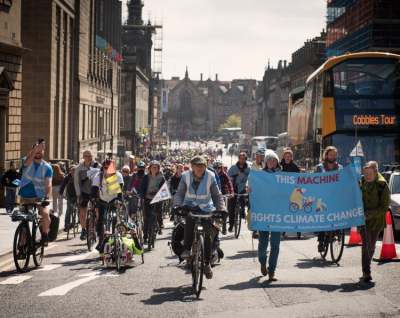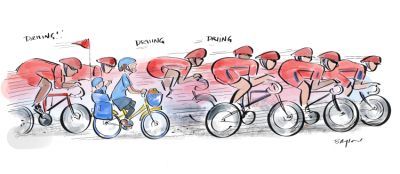Cycling has become increasingly popular in recent years, particularly since 2020 when the Covid pandemic prompted more people to take up cycling for leisure and transport. Following the end of national lockdowns there was a slight dip in cycling activity, but demand for bicycles and interest in cycling remains high.
Demand for e-bikes is also increasing. Currently, around 14% of cyclists in the UK own an e-bike – a figure which has doubled in the last couple of years – and growth looks set to continue.
Over a third of adults in Great Britain are cyclists, with 21% of adults riding at least once a week. However, transport in the UK is dominated by cars. According to the charity Cycling UK, in 2020 cycling represented only 1.8% of all traffic in Great Britain (cars and taxis 73.4%), though this figure was double the average between 2015 and 2019.
Compared to its European neighbours, the UK lags behind on ‘cycling modal share’, i.e. the share of people cycling in comparison to other modes of transport. The UK’s meagre 2% puts it in 22nd place when compared to the 27 countries in the EU. The leader of the pack is the Netherlands, with a cycling modal share of 27%, followed by Hungary (22%), Sweden (16.5%), Denmark (16%), Finland (13.4%) and Germany (11.8%).
How eco-friendly is cycling?
All sectors of the economy have an environmental and social impact – especially those that produce physical goods – which is why we expect businesses to report on and minimise their impact. The last time we examined the bicycle and e-bike sectors, in 2018, we found very little in the way of corporate social responsibility reporting.
Not much has changed this time round, with the vast majority of brands doing little when it comes to reducing their environmental impacts and demonstrating that workers’ rights are consistently respected in their supply chains.
This is something that Trek, one of the first companies to look in depth at its carbon impact, readily admits. Its 2021 Sustainability Report begins with the following admission:
“We make a product that provides a solution to many of the world’s most complex problems – congestion, public health, climate change. But for too long, cycling has been given an environmental pass based on this assumption.”
Bicycle and e-bike brands must address this lack of self-reflection and scrutinise their environmental and social impacts, publish their findings, and lay out plans for how to reduce these impacts.
The market for bikes and e-bikes is growing rapidly, which is fantastic, but brands also need to ensure their products are produced responsibly and sustainably.









